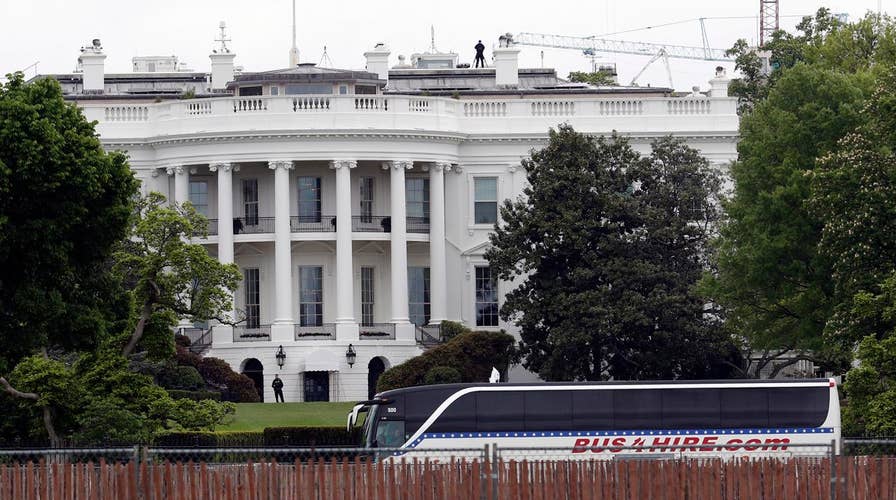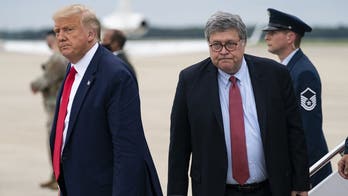Senators gather at White House for North Korea briefing
Chief White House correspondent John Roberts reports
In a rare meeting, the Trump administration invited all 100 U.S. senators for a White House closed-door briefing on North Korea, as Pyongyang parades its nuclear might and the U.S. considers action.
President Trump's secretary of state, defense secretary, top general and national intelligence director were on hand to lay out the North’s escalating nuclear capabilities.
Trump was expected to drop in on the Eisenhower Executive Office Building gathering of lawmakers – though it’s uncertain whether he showed up.
“Past efforts have failed to halt North Korea's unlawful weapons programs and nuclear and ballistic missile tests,” Secretary of State Rex Tillerson, Secretary of Defense James Mattis and Director of National Intelligence Dan Coats said in a joint statement. “With each provocation, North Korea jeopardizes stability in Northeast Asia and poses a growing threat to our allies and the U.S. homeland.”
The statement added that Pyongyang’s pursuit of nuclear weapons is “an urgent national security threat and top foreign policy priority."
The briefing team was scheduled to meet with House lawmakers later at the Capitol.
The unusual meeting reflected the increased American alarm over North Korea's progress in developing a nuclear-tipped missile that could strike the U.S. mainland.
The recent flurry of military activity on and around the divided Korean Peninsula has put the world on high alert.
“The military is obviously planning for a number of options,” Texas Sen. Ted Cruz told Fox News following the meeting. “It is of course the hope that military action does not prove necessary but if there is a clear and imminent threat to the United States, our military needs to be prepared to act.”
Tensions have escalated since Trump took office three months ago, determined to halt Pyongyang's nuclear and missile advances.
In the past two weeks, the president has ordered high-powered U.S. military vessels, including an aircraft carrier, to the region in a show of force to deter North Korea from more nuclear and missile tests.
The North on Tuesday conducted large-scale, live-fire artillery drills, witnessed by national leader Kim Jong Un, as a reminder of its conventional threat to U.S.-allied South Korea.
On Wednesday, South Korea started installing key parts of a contentious U.S. missile defense system against North Korean missiles that also has sparked Chinese and Russian concerns.
America's Pacific forces commander, Adm. Harry Harris Jr., told Congress on Wednesday the system would be operational within days. He said any North Korean missile fired at U.S. forces would be destroyed.
"If it flies, it will die," Harris said.
The Trump administration has said all options, including a military strike, are on the table. However, a U.S. pre-emptive attack isn't likely, according to American officials. Instead, they've said the administration's strategy focuses on increasing pressure on North Korea with the help of its main trading partner, China.
Sen. Ben Cardin, the Senate Foreign Relations Committee's top-ranking Democrat, said he was hoping to hear the Trump administration's game plan Wednesday.
The U.S. needs a strategy to change North Korea's economic and security calculus for it to freeze and ultimately eliminate its nuclear and missile programs, he said, adding: There's no "pretty military solution."
U.S. officials said Wednesday's briefings will center on three key issues: intelligence about the North's capabilities; U.S. response options, including military ones; and how to get China and other countries to enforce existing economic sanctions on Pyongyang, along with ideas for new penalties. The officials weren't authorized to speak publicly about plans for the closed-door briefings and requested anonymity.
"China is the key to this," Sen. John McCain, R-Ariz., said. "The purpose of this briefing is to tell us the situation and the intelligence we have and what (are) the options we have."
Testifying before the House Armed Services Committee, Harris said he expects North Korea, under Kim's autocratic rule, to soon be able to develop a long-range missile capable of striking the United States, despite some spectacular failures in its ballistic missile program. "One of these days soon, he will succeed," Harris said.
North Korea routinely accuses the United States of readying for an invasion, and threatens pre-emptive strikes to stop the U.S.
On Wednesday, North Korea's U.N. mission said it would react to "a total war" with the U.S. with nuclear war. It said it would win in a "death-defying struggle against the U.S. imperialists."
A targeted U.S. attack to take out North Korea's nuclear weapons program could spark a wider war on the Korean peninsula, lawmakers and experts have warned. Harris said the U.S. has "a lot of pre-emptive options," but he declined to provide specifics in an open setting.
China has been urging restraint by both Pyongyang and Washington. In Berlin, Chinese Foreign Minister Wang Yi said Wednesday that North Korea must suspend its nuclear activities, but "on the other side, the large-scale military maneuvers in Korean waters should be halted."
China opposes the Terminal High-Altitude Area Defense system, or THAAD, being installed in South Korea. The U.S. says it will only target North Korean missiles, but China and Russia see the system's powerful radars as a security threat.
In Beijing, Chinese foreign ministry spokesman Geng Shuang said THAAD would upset the "strategic balance" in the region. He said China will take "necessary measures to defend our own interests."
The Associated Press contributed to this report.





